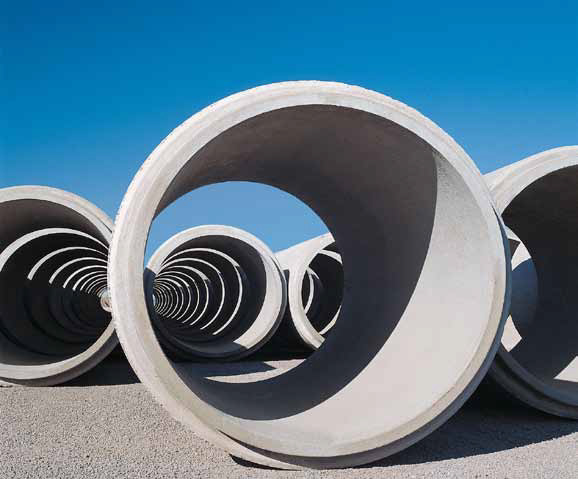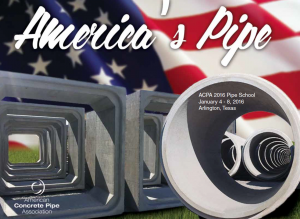(ConcreteProducts.com) – Extended American Concrete Pipe Association Marketing Committee duty, coupled with a long track record as Sherman-Dixie Concrete Industries’ director of Technical Marketing, afford Michael Kusch a different perspective than most ACPA chairmen, typically plant owners or chief executives. In his first address to members as chairman during the ACPA convention last month in Florida, he defined a successful term around expanded training and three other goals: technical marketing, broadened government affairs activities and streamlined committee agendas.
“Our tendency on the Marketing Committee is to have a lot of projects; as chair, I saw times when we had too many balls in the air,” Kusch notes on the latter point. “Before the convention, I asked each committee chair to rank three or four tasks for 2015, indicate budget needs, and set delivery deadlines and dates to review progress. The idea is to concentrate on key things that will help sell more concrete pipe in my term.”
He and ACPA staff will finalize by the end of April projects for each committee, including Government Affairs, which tracks federal legislation funding highway and environmental infrastructure, plus regulations affecting members and customers. To augment its 2015 work, Kusch is impressing on members to bring a lobbying mind set to the local level. “We are asking them to take some of the burden off the association staff, who work with federal lawmakers and agencies, by interfacing at the local level with Congresspersons and state legislators,” he says. “Lawmakers need to be informed of the economic impact the concrete pipe business has on their districts or states … how the whole process of using local, raw materials and producing concrete creates employment.
“We employ a lot of potential voters and need to emphasize that while expressing our support for infrastructure funding measures.” He is also keen on members tracking and countering laws or policy, especially at the state level, that “take engineering out of project specifications.”
INSTRUCTIVE PURSUITS
Ahead of the 2015 Pipe School last month in Orlando, ACPA participated for the first time in the World of Concrete education program. “We saw a real hunger for training across the board with the economy expanding and contractors’ business improving,” says Kusch, “Many have new hires to train.”
The same held at the Pipe School, he adds, as “We had many good ideas from department of transportation and consulting engineer attendees. Everybody wants training, especially for inspectors. Engineering schools used to put more emphasis on concrete than now. We assume younger engineers know about our product, but many need to be informed of its performance and life-cycle benefits.”
Whether internally or to the specifying community, training will command extra attention this year as the third point on the chairman’s short list. “ACPA has a number of new educational tasks on the horizon,” Kusch observes. “One of the most pressing involves teaching members how to improve customer presentations and differentiate the rigid products we sell versus competitors’ flexible pipe. As a technical marketing veteran, I understand the importance of sitting down and discussing product performance and structural differences with consulting or specifying engineers. The more I can differentiate the value of a rigid pipe over a flexible pipe, the more likely an engineer will wish to specify concrete.”
In tandem with sales training for members, ACPA has fostered what he describes as a unified, coast-to-coast force: One producer representative in every state serves as a point person to rally peers and associate members to conduct plant tours and seminars. “These are effective means for taking a message to consulting and specifying engineers, and demonstrating how our product is best,” Kusch affirms.
He rounds out his chairman’s agenda with a fourth priority goal, challenging ACPA producers to consider for their next hire a technical marketing professional whose full-time job is to interact with engineers, municipal officials and specifiers—informing them why concrete pipe should be their first choice. “Specifications drive our industry. We need to educate engineers and specifiers on the differences between rigid and flexible product,” Kusch contends. “Among members, there is a groundswell of interest and recognition in the value of technical marketing staff.”
Alongside technical marketing, ACPA continues to develop a state and regional support staff, adding in 2014 a 10th engineer: Walt Catlett, P.E., Atlantic Coast Region engineer to cover Maryland, Virginia and Washington, D.C. The association is now half-way to a targeted 20-member state and regional engineer network. Advancing the cause is members’ realization of returns on engineering staff investment, both in individual project successes and modified agency drainage specifications favoring concrete solutions. Agencies are showing a greater understanding of drainage structure installation procedures, especially in changes to their field specifications.
Beyond ACPA headquarters and regional staff, engineers will find additional technical support at the concrete-pipe.org site, which is on track for a mid-year relaunch. The new format will be geared less to internal promotion and more to consulting and specifying engineers—giving them the apps and tools needed to stipulate concrete pipe. The site overhaul is part of ACPA’s response to a new generation of engineers who will steer drainage design and construction.
MEMBER ENDORSEMENT
The association has maintained or expanded membership through the latest construction business cycle, and now represents more than 95 percent of U.S. concrete pipe production capacity. “Members see the value of our group and its work,” affirms ACPA President Matt Childs, P.E. “Five years ago we might not have been able to make that claim.”
At the 2015 convention, the board approved a 4 percent dues increase, reflecting what he notes are endorsement of association activities; members’ positive mood on market conditions, especially in commercial and industrial development; and, gains the past few years in drainage market share for concrete pipe. Producers’ outlook is moderate to strong despite flatness of the highway market, owing to the absence of a long-term transportation funding solution and limited prospects for substantive legislation in Washington, D.C.
The dues increase will help fund the work of the Government Affairs, Marketing and other ACPA committees, plus continuing research on concrete pipe wall thickness and a new investigation geared to recording long-term product performance in a wide range of environmental conditions. Compiling data from existing concrete pipe installations across North America, investigators will perform cracking analyses to support what ACPA has traditionally assured specifiers: Minor cracks in concrete pipe are of limited or no consequence to drainage system performance. The project will be the largest to date on concrete pipe, and follow a similar HDPE product investigation from the mid-2000s.
 AMERICAN CONCRETE PIPE ASSOCIATION – AT A GLANCE
AMERICAN CONCRETE PIPE ASSOCIATION – AT A GLANCE
CHAIRMAN (2015)
Michael Kusch
Director of Technical Marketing
Sherman-Dixie Concrete Industries
Nashville, Tennessee
IMMEDIATE PAST-CHAIRMAN (2014)
Rick Traylor
Vice President, Technical Services
Rinker Materials–Concrete Pipe
Division/Cemex USA
Houston, Texas
VICE CHAIRMAN
A.C. “Bo” Gossett, III
President
Gossett Concrete Pipe Co.
Greenville, S.C.
ACPA has been the voice of concrete pipe producers since 1907, making it among the oldest active trade associations in North America. Members contribute to environmental improvement by providing a quality product engineered as a lasting and economical solution to drainage and water pollution control.
Concrete farm drain tile producers chartered ACPA as the Interstate Cement Tile Manufacturers Association in Ames, Iowa, envisioning a group to exchange ideas and establish product standards. They adopted the American Concrete Pipe Association banner in 1914. Today, producer members operate 300-plus plants and, along with associate members, hail from 40-plus countries. ACPA headquarters is located at 8445 Freeport Parkway, Suite 350, Irving, TX 75063; 972/506-7216;www.concrete-pipe.org.
SHERMAN-DIXIE CONCRETE INDUSTRIES – AT-A-GLANCE
One of the largest regional independent producers, Nashville-based Sherman-Dixie has five concrete pipe plants in Tennessee, Indiana and Kentucky. In addition to concrete pipe, it produces precast box culverts; conventional and specialized drainage and storm water retention structures; electrical vaults; manholes; and, three-sided Aqua Arch bridges. Management backs a customer commitment philosophy through innovation, hard work and an outstanding staff of production, sales, service, technical marketing, engineering and administrative professionals. Sherman-Dixie views such commitment as its Badge of Honor.
CONCRETE FIRST
More than 300 concrete pipe professionals from across North America assembled last month in Orlando for the 2015 ACPA Pipe School, spotlighting best practices in production, quality, sales and marketing, safety and engineering design, coupled with visits to Rinker and Hanson Pipe & Precast (shown here) plants in Apopka and Winter Haven, Fla., respectively.
“Our Pipe Schools have long been among the most popular and valuable programs ACPA provides, and each year we find ways to make the week even more rewarding for attendees,” says President Matt Childs. “This year’s theme, ‘Concrete First,’ reinforced our industry’s role in producing the best products in the market, and is designed to unify us behind our common purpose of selling more concrete pipe and box culverts.”
Among 2015 Pipe School highlights a) a new Production & Management Accreditation Program, consisting of six hours of concentrated training in Reinforcement Manufacturing, Vibrated Dry Cast Production, Packerhead Production, Safety and Performance Management disciplines; b) panel discussion examining departments of transportation criteria for choosing between competing pipe products; c) Post Installation Inspection Demonstration offering up-close observations of concrete and flexible pipe installations; d) discussion of Accelerated Precast Construction and its impact on the future; and, e) presentation of best-in-class safety practices from 2015 ACPA Chairman’s Safety Awards finalists.



